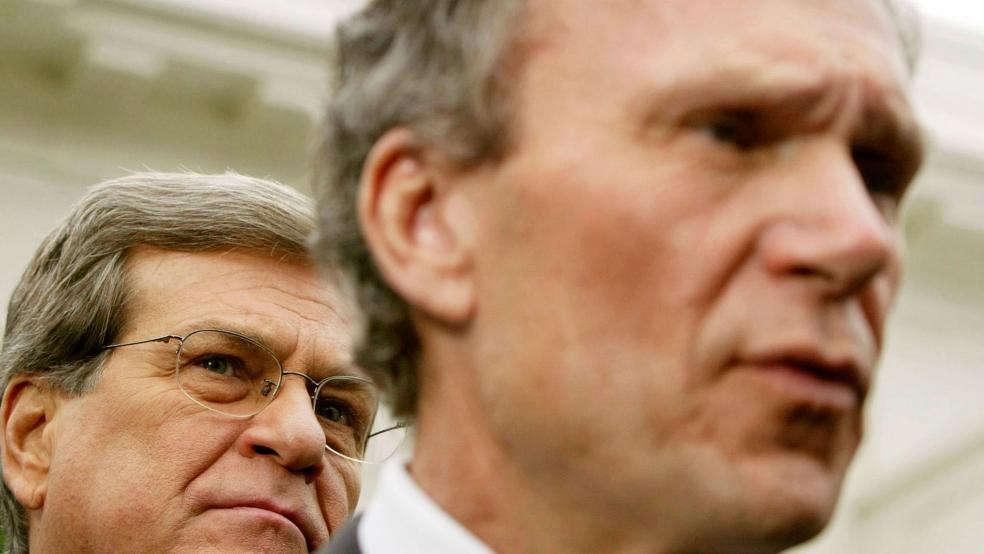Idealism is apparently still alive even after decades of service in the United States Congress. On Tuesday, a high-profile group of former legislators, with the backing of the Bipartisan Policy Center in Washington, unveiled an ambitious proposal to overhaul the workings of American democracy – from how we vote to how Congress operates to how the government hires civil service workers.
The proposal is brimful of common-sense ideas that would make the machinery of government both more transparent and more effective, and it has an all-star lineup of backers. Former Senate Majority Leaders Trent Lott (R-MS) and Tom Daschle (D-SD), former Sen. Olympia Snowe (R-ME), former Secretary of Agriculture Dan Glickman (D) and former Idaho Gov. Dirk Kempthorne (R) served as co-chairs of the commission.
Related: Who Approves of Congress Now? ‘Blood Relatives and Staffers’
The proposal, titled “Governing in a Polarized America: A Bipartisan Blueprint to Strengthen Our Democracy,” organizes its recommendations into three main areas: electoral reform, congressional reform, and a call to national service.
The section on reforming the way we vote urges multiple changes that have long been supported by good government groups. They include removing the responsibility for drawing legislative districts from the hands of partisan legislatures; expanding voting access, and calling for a single nationwide date for primary elections.
Former Michigan Gov. Jennifer Granholm, who served on the subcommittee on electoral reform, said that additional enhancements to the system would bring the U.S. in line with other developed countries. “How retrograde are we?” she asked, noting that it is “insane” that it remains impossible to register to vote online.
Related: House GOP’s Self-Defeating Census Cuts
Discussing congressional reforms, Sen. Snowe, a Republican, said, “Congress can be made to work again and it must be made to work again.” She said the report recognizes that “partisanship will not diminish in the short term,” but still offers what she characterized as reforms to which both parties can agree.
Among them is a rationalizing of the two chambers’ work schedules. Currently, legislative business is done only a few days a week, and Congress takes lengthy recesses throughout the year; there are considerable periods of time when one house is in session while the other is out of town. The proposal calls for a system under which Congress is in session five days a week for three weeks in a row, followed by a full week off for work in members’ home districts.
In addition, it would mandate regular joint caucus meetings, aimed at giving Republicans and Democrats more opportunities to find issues on which they have common ground and can work together. It would also limit the use of some of the more controversial legislative tactics, such as anonymous holds on nominees. Interestingly, it appears to advocate the “talking filibuster,” meaning that any senators wishing to indefinitely extend debate on an issue would actually be required to remain on the floor of the Senate.
Related: Fed Finds Polarization in D.C. Drives Inequality
The third section of the proposal is a call to national service, including the recommendation that all Americans, sometime between their 18th and 28th birthdays, dedicate a year of their lives to public service at the national or community level. It also calls for making it easier and more desirable for talented individuals to decide on public service as a career path – either as an elected official or a civil servant.
The proposal is high-minded and well composed. Sadly, its high-mindedness may not play very well in the current political environment. The recommendations rely, in large part, on parties that benefit from the failings of the current system – lawmakers ensconced in gerrymandered safe districts, state lawmakers with a vested interest in reduced voter turnout, and federal bureaucrats who benefit from little competition from new hires – to take action that is pretty clearly against their own self-interests.
As Martin Frost, a former member of the House from Texas remarked at the presentation Tuesday, the commissioners have taken a page from Blanche DuBois in A Streetcar Named Desire in that they are depending on “the kindness of strangers.”
Top Reads from The Fiscal Times:





